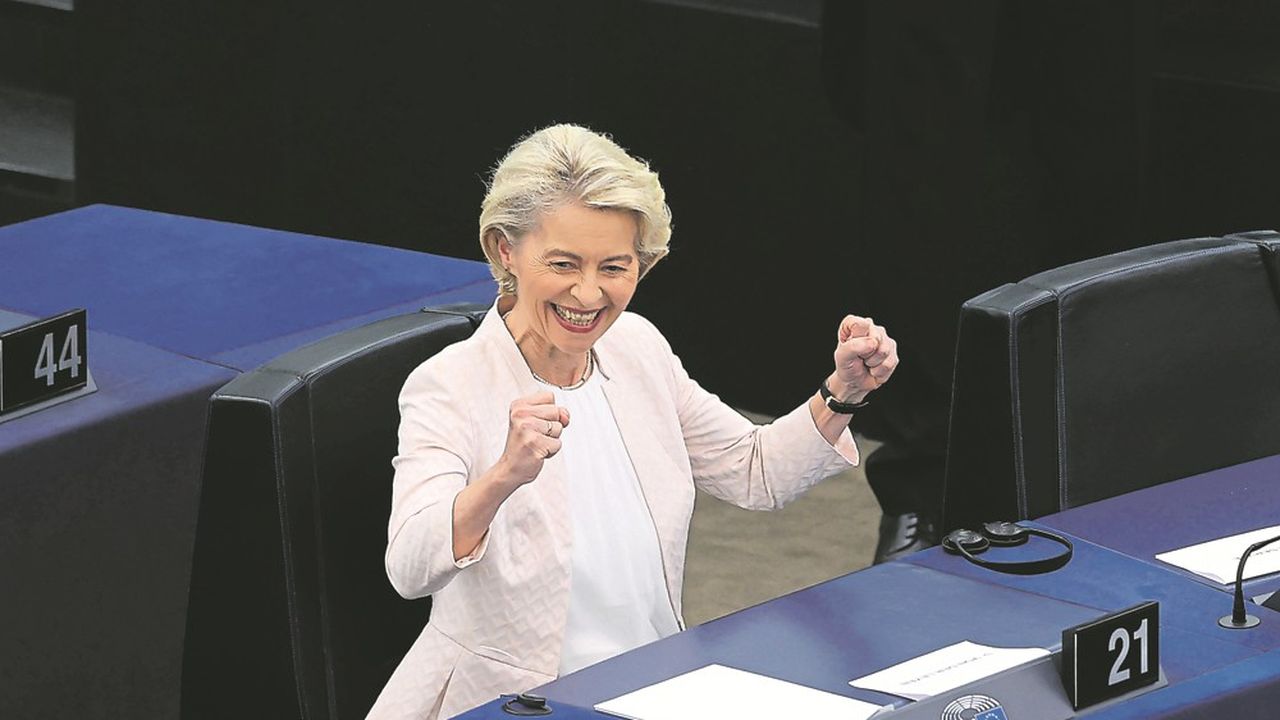
Ursula von der Leyen must postpone the presentation of her new college by a week. The Commission President, reappointed in July for a second five-year term, was due to meet the leaders of the political groups in the European Parliament on Wednesday 11 September to present the composition of her team of 26 commissioners.
But, since Slovenia recently changed its candidate for the European executive, in favour of a woman, Marta Kos, the Slovenian Parliament has not yet officially ratified this choice. It would be risky for Ursula von der Leyen to include the diplomat in her casting without certainty. Her meeting with the presidents of the parliamentary groups is therefore postponed to Tuesday, September 17, in Strasbourg, where the Parliament will meet in plenary.
The formation of her second college is turning into a headache for the President of the Commission. While she had asked each Member State to propose a ticket with one man and one woman, to allow her to build a gender-balanced team, the capitals ignored her request – with the exception of Sofia. After auditioning the two Bulgarian candidates, Ursula von der Leyen unsurprisingly selected the former Minister of Foreign Affairs Ekaterina Zaharieva, and can therefore display 10 women in her team, against 16 men.
Socialist Disappointment
If, as can be expected, the European Parliament rejects the Hungarian candidate in October, who is too close to Viktor Orban and Moscow, and if Budapest proposes a woman as a second choice, the ratio will certainly improve to 11 against 15. But it would be less good than in 2019. This decline is not going down well in European circles.
This is not the only imbalance: the Socialists, who form the second largest political group in Parliament, would be represented by only four commissioners. This reflects the current political map of the EU, where few member states are led by a Socialist – and Olaf Scholz has agreed to reappoint conservative Ursula von der Leyen.
But on Tuesday 10 September, the European Socialist Party expressed its bad mood in a slightly threatening press release. It deplores the fact that its leading candidate in the European elections, Nicolas Schmit, was not chosen as Commissioner by Luxembourg, as an unwritten rule would have required. The Socialists also expressed their concern at seeing the emergence of “a Commission that does not adequately reflect European values and progressive priorities”.
Conservatives on the ball
It is said that the conservatives of the European People’s Party (EPP, the largest group in the Parliament by far) are seeking to deprive the Spanish socialist candidate, Teresa Ribera, of the energy transition super-portfolio that she is eyeing (it is her area of expertise). They would have no desire to see a great defender of climate protection zealously implement the Green Deal adopted in the last legislature.
The EPP, which is strong in Parliament, will also be strong in the Commission, with 13 commissioners, not counting the president. Half of the college, therefore. “We can see clearly, from now on, that the EPP will be dominant. See, they have already appointed their rapporteur for the negotiations on the post-2027 multiannual financial framework, they are on the ball,” notes a Commission source.
Another topic that displeases not only the socialists, but also the centrists of Renew: the possible allocation of a position of executive vice-president to the Italian candidate, Raffaele Fitto, affiliated with the eurosceptic ECR party of Giorgia Meloni. He would also be in charge of such strategic issues as cohesion policy, economic affairs and the post-Covid recovery plan.
Executive Vice Presidents
Valérie Hayer, president of the liberal group Renew Europe, has already said all the bad things she thinks about such an option, in the program “La faute à l’Europe”: “This would mean that Ursula von der Leyen places a far-right commissioner, who did not even support her candidacy for re-election, among the big names of the European Commission.”
According to the rumours and organisation charts circulating in Brussels, there would be four other executive vice-presidents: the Latvian Valdis Dombrovskis (Enlargement, Ukraine?), the Slovak Maros Sefcovic (Administration and simplification?), Teresa Ribera (Green and digital transition?), and the Frenchman Thierry Breton (Industry and strategic autonomy?).
All this could change between now and next week. The hearings of the candidates by the competent parliamentary committees should take place in mid-October. Knowing that the Parliament always rejects some of them, the next Commission will probably take office on 1er December, not the 1ster november.




